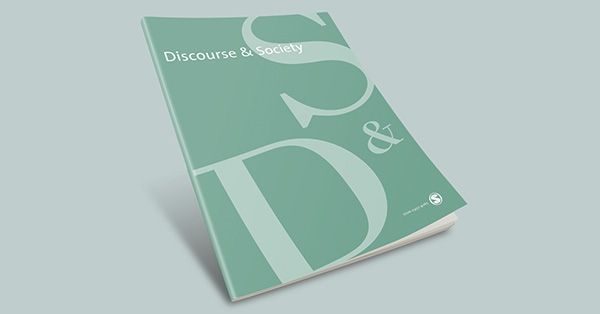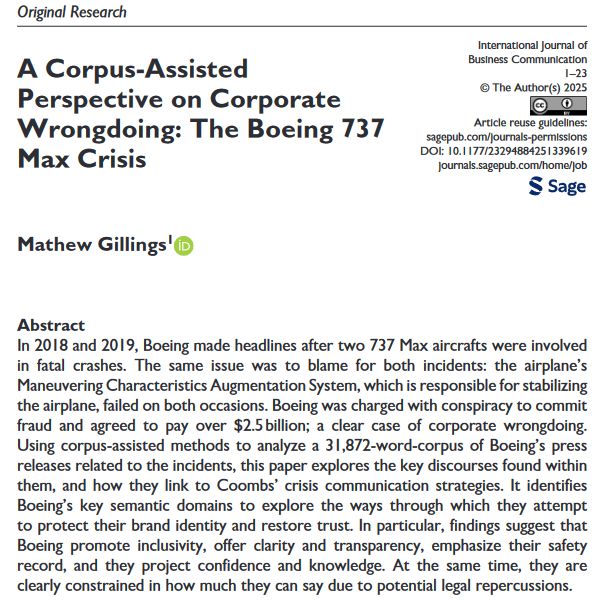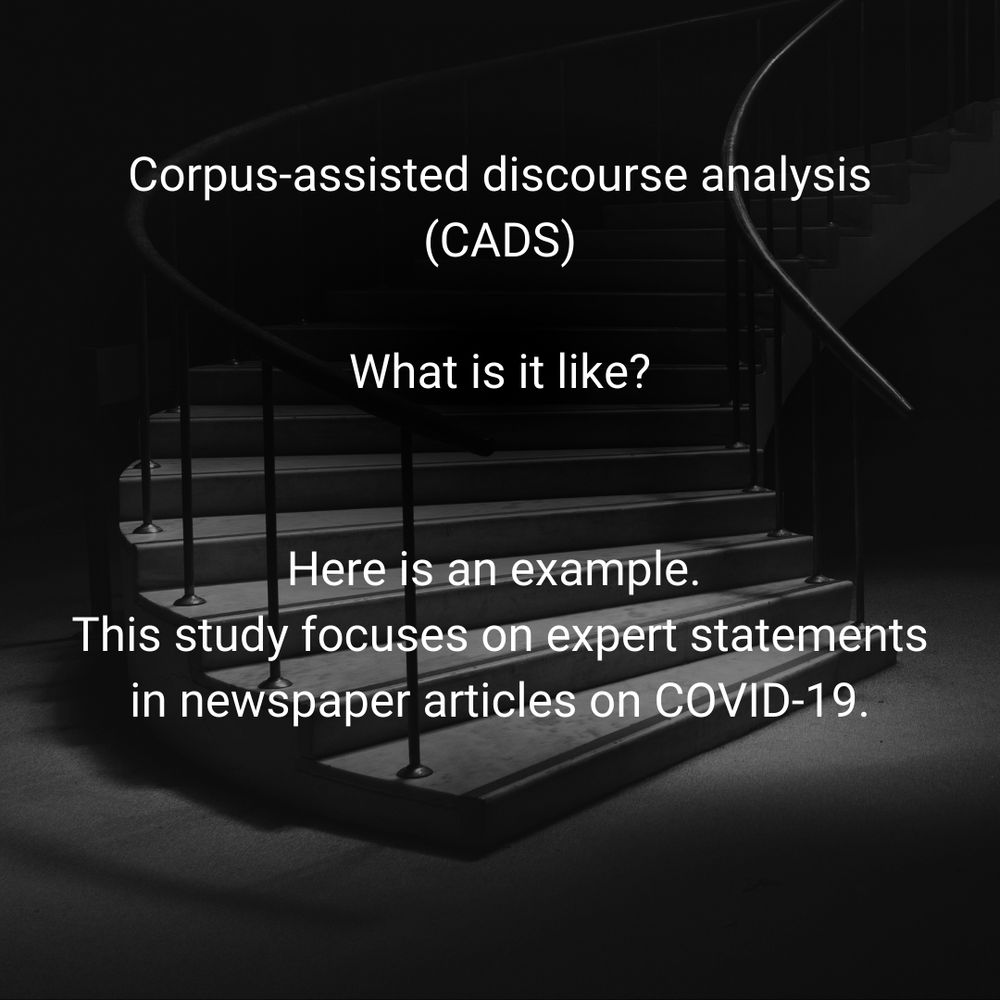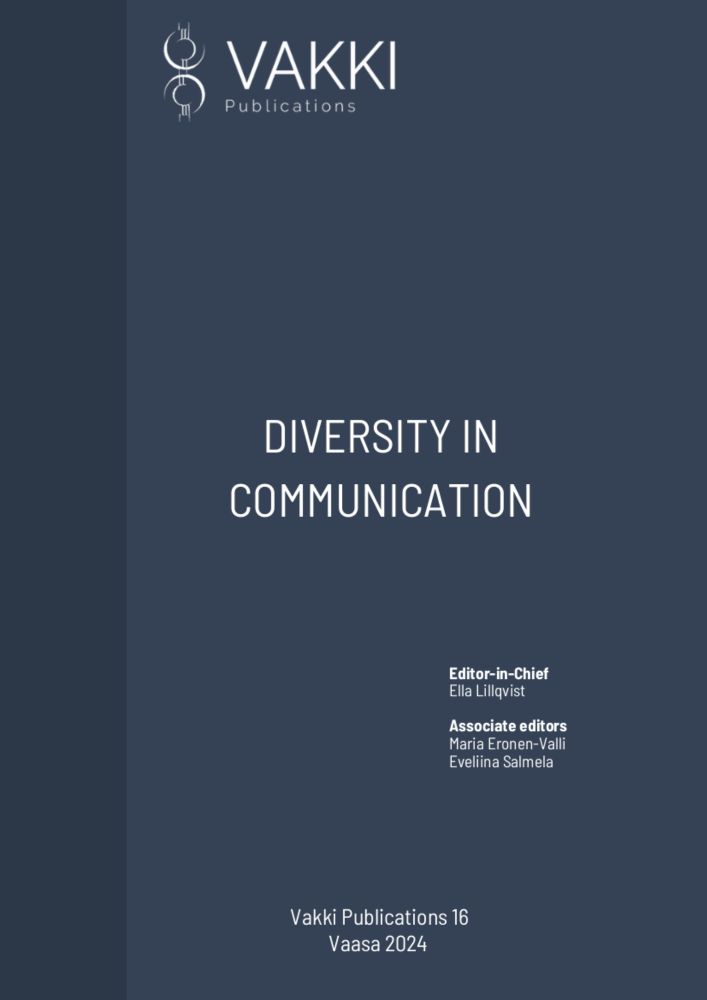
You still have about two weeks to submit your abstract to our upcoming conference in Helsinki in March, 2026.
Deadline for abstract submission: 31st October, 2025.
A warm welcome to discuss crises and language with us!
@languaging-crises.bsky.social
Research project focusing on diachronic perspectives on public communication during three pandemics. Funded by Research Council of Finland. Sociolinguistics, discourse analysis, corpus linguistics

You still have about two weeks to submit your abstract to our upcoming conference in Helsinki in March, 2026.
Deadline for abstract submission: 31st October, 2025.
A warm welcome to discuss crises and language with us!
So, a right-wing Finnish thinktank just published a populist pamphlet that criticises the funding choices of the Research Council of Finland when they concern humanities and social sciences research, and calls for "useful" research only to be published and for us to 'thin the herd' ourselves 🧵
01.10.2025 08:50 — 👍 24 🔁 6 💬 5 📌 1Call for Papers: Languaging Crises conference in Helsinki in March 2026!
Organized by @languaging-crises.bsky.social
@minneva.bsky.social , @hannalimatius.bsky.social, @jenniraikkonen.fi

Call for Papers for the Languaging Crises conference (4–5 March, 2026) is published!
We warmly welcome you to Helsinki!
Proposal submission deadline: 31 October, 2026
blogs.helsinki.fi/languaging-c...
A lecture by our collaborator Merja Koskela, a professor of Communication Studies at @univaasa.bsky.social, introduces some of the basics of crisis communication. What is a crisis? What is crisis communication? What academic approaches exist for studying crisis communication?
26.08.2025 10:07 — 👍 5 🔁 2 💬 0 📌 0
firefighter battles a large blaze with a water hose Photo by Oskar Kadaksoo on Unsplash
We are planning a conference on crisis communication to be held at the University of Helsinki in March 2026.
Stay tuned if you are interested in attending!
@helsinki.fi #crisiscommunication
blogs.helsinki.fi/languaging-c...
Check out the poster that we presented at #CL2025 !
The poster introduces our two ongoing case studies, one focusing on constructions of ingroups and outgroups in comments posted on the CDC’s Instagram posts, the other on epistemicity in Boris Johnson and Donald Trump’s speeches on COVID-19.

Check it out - the corpus MOOC is back (15th September) on a new platform (edX) exploring new topics, including AI. One thing has not changed - it is still free to access 😁 Find out more here: www.edx.org/learn/social...
11.08.2025 07:48 — 👍 54 🔁 27 💬 1 📌 3
My latest article has been published in Discourse & Society! The paper explores how marginalised groups are referenced and included in COVID-19 statements published on official government websites in the UK and the US. @languaging-crises.bsky.social
journals.sagepub.com/doi/10.1177/...
The word is out! Next IPrA is in our (Finnish) neck of the woods, in Helsinki 🇫🇮 Pragmaticians, converge!
25.06.2025 04:23 — 👍 22 🔁 4 💬 0 📌 0
New paper out in the International Journal of Business Communication on corporate wrongdoing -- specifically how Boeing navigated the 737 Max crisis a few years ago. Check it out open access here: doi.org/10.1177/2329...
27.05.2025 07:51 — 👍 10 🔁 5 💬 0 📌 02/2 responsibility is potentially doing more harm than good…
#ADDA25 Very interesting work by @languaging-crises.bsky.social!
We're already on talk #3 in the "Influencer Discourse" panel at #ADDA5! Hanna Limatius (from the @languaging-crises.bsky.social project) is showing us how beauty influencers and authorities collaborated during the Covid-19 pandemic and how this was received by their audiences.
22.05.2025 09:51 — 👍 9 🔁 2 💬 0 📌 0#ADDA25 : @hannalimatius.bsky.social presented her analysis of comments posted on YouTube videos of two beauty influencers who collaborated with president Joe Biden to discuss COVID-19 vaccines. The goal of the videos was to reach an audience that does not necessarily follow the official channels.
23.05.2025 05:13 — 👍 2 🔁 2 💬 0 📌 0In addition, @jenniraikkonen.fi will present her CADS study on the use of expert statements in American newspaper articles on the COVID-19 and 1918 influenza pandemics. What types of differences are there between a liberal broadsheet and a conservative tabloid? See you there!
#CL2025
See you at #CL2025 in Birmingham! Our poster presentation introduces our two ongoing studies on COVID-19 communication: 1) citizens’ responses to authorities’ social media communication during COVID-19; and 2) expressions of epistemicity by Donald Trump and Boris Johnson.
17.04.2025 05:21 — 👍 4 🔁 1 💬 0 📌 1
During past months, I have been analyzing expert statements in newspaper articles about COVID-19 and the 1918 influenza. The process has been messy, as I have tried different methods of analysis. The following process has been quite fruitful, while quite messy. #CADS
27.03.2025 08:01 — 👍 3 🔁 1 💬 1 📌 0Päättävässä asemassa olevat ovat avainroolissa yhteiskunnallisten kriisien keskellä. Heidän viestinsä vaikuttavat merkittävästi mielikuviimme tilanteesta.
Miten kriisistä tulisi viestiä, jotta luottamus päättäjiin säilyy ja heidän koetaan olevan tilanteen tasalla? #kriisiviestintä
Insights from VAKKI symposium 2025:
As previous and on-going crises have demonstrated, third sector and volunteers can have crucial roles in crisis management practices. But the ways and channels of collaboration need to be planned beforehand, as the crisis situation can be chaotic.
Using rhetorical arena theory, Limatius and Koskela investigate communicative choices made in authorities’ COVID-19 communication in the U.S.
Various different voices were present, but ultimately, they were strategically harnessed by the government to advance their communicative goals.

Whose voices were present in the crisis communication in the US during the COVID-19 pandemic?
Paper by @hannalimatius.bsky.social and Merja Koskela has been published open access in the VAKKI publication series:
Today, a guest lecture by Prof Merja Koskela: "Rhetorics of crisis communication: From organizational to societal perspectives" at the Uni of Helsinki. Topics include the role of digital communication in crisis management and the power dynamics embedded within these communicative practices.
21.11.2024 08:36 — 👍 1 🔁 1 💬 0 📌 0We will organize a workshop at the VAKKI symposium in Vaasa on February 13–14, 2025! We hope to get presenters from different fields interested in crisis communication. The description of the workshop is only in Finnish, but presentations in English are also welcome!
sites.uwasa.fi/vakki/sympos...
Thus: Uncertainty of the situation was not particularly highlighted in the speeches, although it was acknowledged to some degree by Johnson. We will continue the research by comparing these findings to "normal times". Were there more expressions of uncertainty during COVID-19 than before that? 6/6
11.11.2024 07:48 — 👍 0 🔁 0 💬 0 📌 03) Johnson expressed empathy by repeatedly saying that he knows that these are difficult times and causes a lot of distress.
4) Already at the very beginning of the crisis in March 2020, both speakers emphasized that we will survive and we will beat the virus. We will be stronger than ever. 5/
2) Trump did not always follow the script, which caused that he used a lot of fillers such as "I think", "I guess" and "don't know". These were not used to acknowledge uncertainty (except when Trump gave estimates and was not certain if what he said was correct). 4/
11.11.2024 07:48 — 👍 0 🔁 0 💬 1 📌 0We have studied how Donald Trump and Boris Johnson managed uncertainty in their COVID-19 press briefings. Our findings so far:
1) Johnson acknowledged uncertainty by highlighting that the situation will be constantly reviewed and that changes will be made to the current restrictions if needed. 3/
... 1) uncertainty should be normalized (eg. "this is always the case with new viruses")
2) communicators should clarify what is known, what is not known, and what is being done to reduce the uncertainty
3) acknowledging uncertainty should be accompanied with other strategies, such as empathy... 2/
Crises are, by definition, high-uncertainty situations. Acknowledging uncertainty should be part of crisis communication. But uncertainty can generate negative psychological effects. How to avoid that? It has been suggested that... 1/
11.11.2024 07:48 — 👍 2 🔁 0 💬 1 📌 1